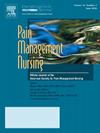Associations Between Cognitive Performance and Self-Efficacy for Pain Management in Older Adults With Chronic Pain
IF 1.6
4区 医学
Q2 NURSING
引用次数: 0
Abstract
Background
Self-efficacy for pain management is the key to successful pain management, yet little is known about the effect of cognitive performance on self-efficacy for pain management. This study aimed to examine to what extent cognitive performance is related to self-efficacy for pain management in older adults with chronic pain.
Methods
The analyses utilized data from the baseline assessment of the MOBILIZE Boston Study. Five neuropsychological tests—the Clock in the Box Test, Letter Fluency Test, Trail-making Test, Hopkins Verbal Learning Test, and WORLD Test—were performed to measure the cognitive performance domains of 458 participants, aged 70 years and reporting chronic pain and self-efficacy for pain management. We measured self-efficacy for pain management using the Chronic Pain Self-Efficacy Scale. Statistical analyses were done using multiple linear regression analysis.
Results
After adjusting for sociodemographic factors, general cognitive performance, executive function, as measured by the Clock in the Box Test, and attention, as measured by the Trail-Making Test Part A, were significantly associated with self-efficacy for pain management in older adults with chronic pain. However, after controlling for sociodemographic factors, chronic conditions, pain interference, and physical performance, the associations between cognitive performance measures and self-efficacy for pain management weakened.
Conclusion
Greater cognitive performance in attention and executive function might be associated with better self-efficacy for pain management. Future longitudinal research is required to investigate the long-term implications of cognitive performance changes on the progress of self-efficacy for pain management in community-dwelling older adults.
慢性疼痛老年人的认知能力与疼痛管理自我效能之间的关系
背景:疼痛控制的自我效能感是成功控制疼痛的关键,但人们对认知能力对疼痛控制自我效能感的影响知之甚少。本研究旨在探讨认知能力在多大程度上与患有慢性疼痛的老年人的疼痛管理自我效能有关:分析利用了波士顿 MOBILIZE 研究的基线评估数据。我们进行了五项神经心理学测试--盒中时钟测试、字母流畅度测试、寻迹测试、霍普金斯言语学习测试和WORLD测试--以测量458名年龄在70岁以上、报告有慢性疼痛和疼痛管理自我效能的参与者的认知效能领域。我们使用慢性疼痛自我效能量表来测量疼痛管理的自我效能。统计分析采用多元线性回归分析法:结果:在对社会人口学因素进行调整后,患有慢性疼痛的老年人的一般认知能力、执行功能(通过 "盒中时钟测试 "进行测量)和注意力(通过 "追踪测试 A 部分 "进行测量)与疼痛管理自我效能显著相关。然而,在控制了社会人口因素、慢性疾病、疼痛干扰和身体表现之后,认知表现测量与疼痛管理自我效能之间的关联减弱了:结论:注意力和执行功能方面的认知能力越强,疼痛管理自我效能越高。未来需要进行纵向研究,以调查认知能力的变化对社区老年人疼痛管理自我效能进展的长期影响。
本文章由计算机程序翻译,如有差异,请以英文原文为准。
求助全文
约1分钟内获得全文
求助全文
来源期刊

Pain Management Nursing
医学-护理
CiteScore
3.00
自引率
5.90%
发文量
187
审稿时长
>12 weeks
期刊介绍:
This peer-reviewed journal offers a unique focus on the realm of pain management as it applies to nursing. Original and review articles from experts in the field offer key insights in the areas of clinical practice, advocacy, education, administration, and research. Additional features include practice guidelines and pharmacology updates.
 求助内容:
求助内容: 应助结果提醒方式:
应助结果提醒方式:


